As affiliate marketing surges, experts expect this channel to reach nearly $37 billion by 2030. This is a golden opportunity for financial service companies.
Affiliate marketing offers a fresh approach in a world where building trust and simplifying complex financial products can seem like an uphill battle. By partnering with credible voices, you can bridge gaps between your brand and consumers, making financial decisions less daunting for your audience.
This guide examines how financial services (finserv) brands and affiliate marketing work together. Understanding the benefits of financial services affiliate marketing boosts brand awareness and propels business growth.
Contents
- Understanding financial services and its unique challenges
- Affiliate marketing: Opening growth pathways for your finserv brand
- 4 commission types powering financial affiliate program success
- Partner types that work best with financial services brands—from influencers to customer advocates
- How affiliate software works
- A quick guide to getting started with finserv affiliate marketing as a brand and an affiliate
Understanding financial services and its unique challenges
Finserv encompasses a wide range of businesses, products, and services. Retail banks, stock brokerages, and mortgage providers fit into the category. The list also includes credit card issuers and state-of-the-art applications that help secure payments.
Like Acorns or Patreon, these financial tech (fintech) companies fall within finserv. Fintech apps and services often grow faster than many traditional finserv companies. The global fintech market value is expected to reach nearly $310 billion dollars in 2022.
Between more prominent finserv players and expanding fintech, the financial services industry has seen massive expansion. However, despite all this growth, clear obstacles still exist for finserv brands.
Challenges for financial services companies
Finserv companies often act as substitute teachers—providing consumers with personal finance education, since schools hardly cover the topic. Finserv brands frequently build strong financial foundations and trust consumers. As high as 92 percent of millennials do not trust banks, placing the responsibility on finserv brands to build trust and communicate complex topics.

Finserv promotion walks a fine line: Keep the message clear and engaging while communicating the facts. Consumers hesitate to trust their money to brands and services they do not understand. Finserv has built-in terminology and jargon layers, exacerbating mistrust and poor financial literacy.
Financial decisions often carry severe emotional stakes, as they can impact a consumer’s financial future. As a result, consumers gravitate toward finserv brands that build relationships and instill confidence.
Affiliate marketing helps brands effectively accomplish these goals. Traditional advertising often falls short, sometimes relying on outdated tricks and strategies. However, affiliate marketing offers an alternative that works much better for finserv brands.
Affiliate marketing: Opening growth pathways for your finserv brand
Affiliate marketing is a performance-based system. Rather than investing a large marketing budget upfront, brands work with affiliate partners to drive traffic and sales.
For instance, a financial blogger or advisor recommends an investment app or service. The blogger receives a commission when a reader taps on a link, downloads the app, and signs up. Affiliate deals vary, and payouts occur at different stages of the interaction.
Affiliate programs are a results-driven marketing strategy, with genuine interest and sales resulting in affiliate payouts. Affiliates are motivated to integrate recommendations into their content because they earn revenue every time a reader purchases through their links.
This unique type of marketing sets it apart from general advertising campaigns and methodologies. Next, consider why affiliate marketing is better.
More finserv companies leverage the potential of affiliate marketing over traditional advertising
Commercials and ads are disruptive since they pull consumers away from the content they want to engage with. Ad campaigns spread a wide net, hoping to catch the attention of a few people interested in a product.

Affiliate partnerships offer finserv brands the chance to position themselves in the best context via recommendations created by trusted partners, such as influencers and publishers. All parties involved benefit:
- The finserv company gains trust and access to valuable audiences
- The affiliate gets a commission
- The consumer receives honest recommendations on high-interest products
Modern finserv brands already enjoy the benefits of these affiliate partnerships. For instance, IG Group—a global online trading and investment company based in the UK—achieved #1 ranking in a Forex Broker Table with a long-term comparison table partner. This led to an outstanding 381 percent increase in action.
Additionally, through strategic collaborations with affiliates, IG Group obtained the highest average first deposit value of £4,800, compared to a program average of £2,600.
Why financial services can find new revenue opportunities through affiliate marketing programs
Financial services (Fiserv) can no longer afford to overlook the power of affiliate marketing. The global affiliate marketing industry is estimated to be worth $27.78 billion in 2024, which presents a lucrative opportunity for financial brands to expand their reach and influence.
The Financial Industry Affiliate Marketing Report 2024 reveals insights from over 110 affiliates, influencers, and publishers within fintech and banking, highlighting significant trends and growth potential. By leveraging affiliate marketing, financial services can effectively guide consumers through complex financial decisions, enhancing engagement and driving growth.
Take a look at affiliate partnerships’ transformative potential and discover why they are a strategic asset for financial brands seeking to thrive in a dynamic market.
Financial products are essential across life stages.
Financial products are essential at every stage of life, from opening a first bank account to planning for retirement.
- Young adulthood (18-25 years): Leverage student loans for educational expenses, credit cards to build credit and establish healthy financial habits, and savings accounts to start financial management.
- Early career (25-35 years): Use key financial products like investment accounts, car loans, and first-time homebuyer mortgages to support wealth accumulation and financial independence, setting the stage for long-term security.
- Mid-career (35-50 years): Focus on expanding financial portfolios with advanced investment options, life insurance, and estate planning services to manage family responsibilities and ensure future stability.
- Pre-retirement (50-65 years): Prioritize retirement savings plans, annuities, and long-term care insurance to secure a comfortable and financially smooth transition into retirement.
- Retirement (65+ years): Emphasize income stability and wealth preservation through financial products like reverse mortgages, Medicare supplements, and fixed-income investments, which help maintain lifestyle and manage medical expenses.
Affiliates, trusted for their expertise, help consumers make informed decisions about these critical products, enhancing financial literacy and confidence.
Source: Tiffany “The Budgetnista” Aliche helps people transform the way they think about their finances
With increasing consumer interest in investment, savings, and credit products, this ongoing demand creates a valuable opportunity for finserv brands to tap into the power of affiliate marketing.
Affiliates make financial products more accessible
Financial products often have complex terms and long-term implications that can overwhelm consumers. For example, retirement plans like 401(k)s and IRAs involve complicated tax rules and investment choices that require careful thought. On the other hand, mortgage loans present their own challenges, with varying interest rates, amortization schedules, and potential penalties.
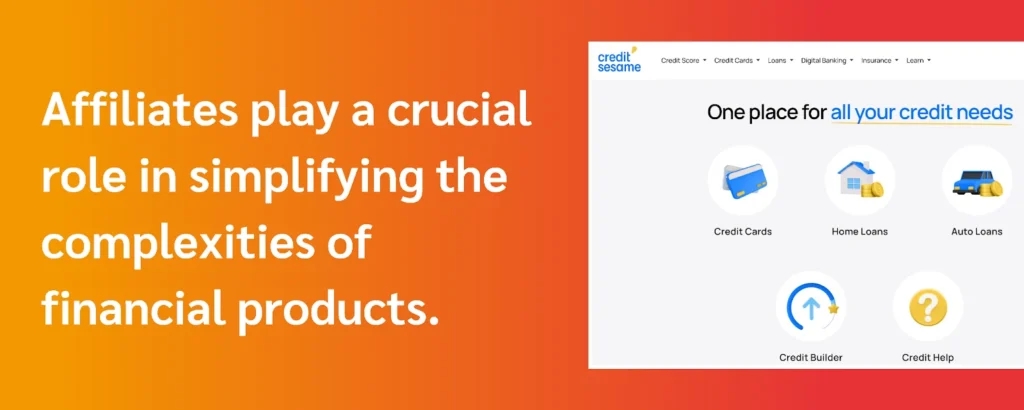
Source: Credit Sesame provides quality financial education for credit and loans.
They offer clear, straightforward explanations and trustworthy recommendations, helping consumers navigate financial products confidently. For instance, Creator Steve Chen helps individuals become financially literate by empowering them to become more money-conscious and invest early—from how-to tutorials to expert advice.
This approach builds trust and encourages greater engagement, as consumers are more likely to take action when they fully understand their options and feel confident in the recommendations they receive.
Financial decisions drive significant earnings
Financial decisions, such as retirement plans or investment platforms, often involve substantial monetary commitments. These high-stakes choices require consumers to trust the advice they receive, and affiliates play a crucial role in offering clear, reliable guidance.
For example, an affiliate might comprehensively compare investment platforms, helping consumers understand which option best suits their financial goals.
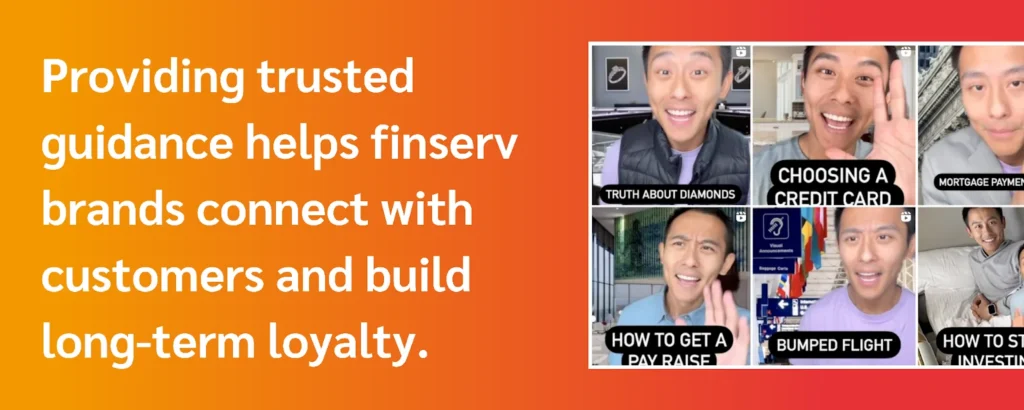
Source: From mortgage loan hacks to investment tips, John Liang spread awareness of financial education
When consumers take action, whether by opening an account, applying for a loan, or purchasing an insurance policy, it often results in a high-value transaction for the financial institution. This leads to higher potential earnings for both financial service brands and their affiliate partners.
Many financial products also offer ongoing revenue potential. For instance, a customer who opens an investment account may continue to add funds regularly, generating recurring commissions for the affiliate.
Partnering with affiliates allows brands to keep pace with finserv trends
New apps, platforms, and services are constantly emerging to meet changing consumer demands. These include mobile payment solutions, robo-advisors, blockchain-based services, and AI-driven affiliate marketing.
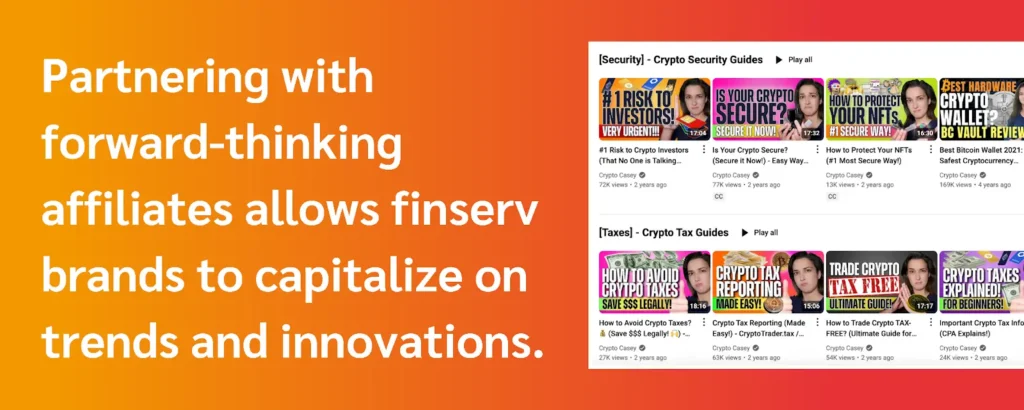
Source: Crypto Casey creates educational content about finance, economics, blockchain technology, bitcoin, cryptocurrencies, and global news stories affecting the markets.
Whether it’s a new budgeting app or an innovative investment platform, these partnerships help brands stay competitive by keeping their offerings relevant and appealing to a tech-savvy audience.
Affiliates help fill the financial knowledge gap
Studies show that 66 percent of adults wish to increase their financial knowledge, with 80 percent of Gen Z expressing similar goals. This interest creates valuable opportunities for finserv brands to use affiliate marketing.
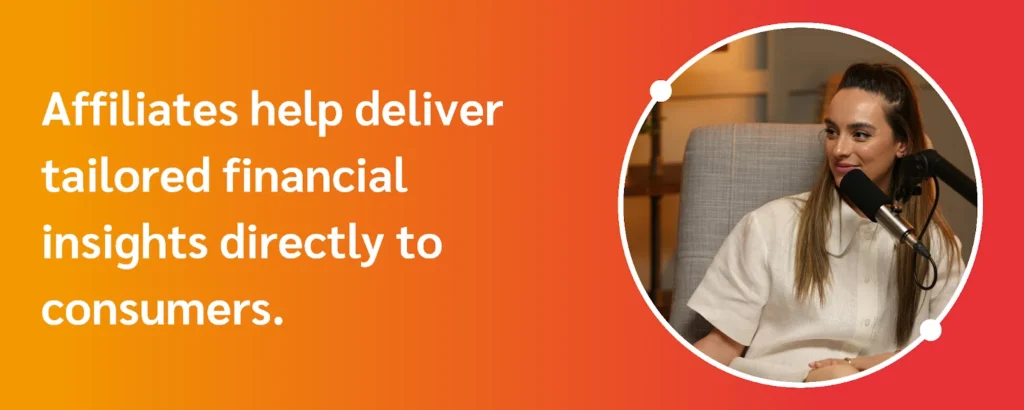
For example, an affiliate might create a comprehensive guide on budgeting for young professionals, breaking down complex financial terms and offering practical tips for managing expenses.
Affiliates, often seen as trusted sources, can provide personalized recommendations and advice that resonate with their audiences. Plus, by creating content that simplifies complex financial concepts and provides actionable advice, affiliates can position themselves as trusted advisors. This approach builds credibility for both affiliates and the brands they represent.
4 commission types powering financial affiliate program success
Designing an effective commission structure is crucial for the success of financial affiliate programs. Here are some strategic approaches to consider when crafting your commission model.
1. Hybrid commission structures

A hybrid commission structure that combines upfront payments with residuals for customer retention offers a strategic advantage for financial service brands looking to boost the success of their affiliate marketing programs. This model is particularly beneficial in driving immediate actions, like sign-ups or downloads, and promoting sustained customer engagement.
Incentivizing affiliates with upfront rewards and ongoing residual payments tied to customer retention strengthens partnerships between financial brands and their affiliates. This approach motivates affiliates to deliver quick results and ensures they remain invested in the long-term success of the customer relationship.
For finserv brands, this hybrid model aligns the interests of affiliates with their own goals, creating a win-win situation that drives conversions and builds lasting customer loyalty.
2. Performance-based incentives

Performance-based incentives are a great way to motivate affiliates to generate high-quality leads and conversions, especially in the financial services sector. Rewards are directly tied to measurable outcomes like sign-ups, leads, or conversions, ensuring that affiliates focus on delivering results that align with the brand’s strategic objectives.
Focusing affiliates on the most impactful actions creates a deeper alignment between the brand’s goals and the affiliates’ efforts. When affiliates are rewarded based on their performance, they are more likely to invest in targeted marketing strategies, optimize their campaigns, and continuously seek ways to improve their results. For finserv brands, this leads to a more efficient and results-driven affiliate program where both parties work towards the same goals.
3. Tiered commission rates
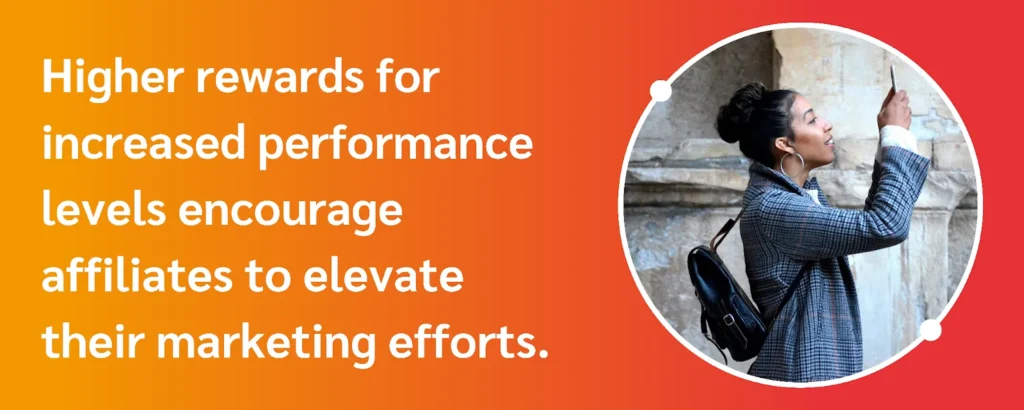
Higher rewards for increased performance levels allow financial service brands to motivate affiliates to elevate their marketing efforts. This tiered approach creates a dynamic incentive structure that encourages affiliates to strive for higher conversions and enables brands to reward those who consistently deliver exceptional results.
The promise of higher earnings as they reach specific milestones is a strong motivator for top-performing affiliates. It drives them to optimize their strategies, expand their reach, and engage more effectively with their audiences. This structure also gives brands a clear view of their most valuable affiliates, enabling them to invest more resources in nurturing these high performers. Over time, this approach leads to stronger partnerships, greater loyalty, and a more successful affiliate program.
4. Milestone bonuses

Milestone bonuses are an effective tool for finserv brands aiming to elevate their affiliate marketing programs. These bonuses offer affiliates extra motivation to go beyond standard performance metrics. Rewarding affiliates for reaching specific targets, like generating more leads or hitting a high conversion rate, drives them to exceed expectations.
For financial service brands, incorporating milestone bonuses into their affiliate programs drives higher performance and strengthens relationships with top affiliates. This strategy helps build a loyal and committed network of affiliates deeply invested in the brand’s success, leading to a more results-driven affiliate marketing program.
Partner types that work best with financial services brands—from influencers to customer advocates
Financial services brands can benefit from a diverse range of affiliate partnerships. Each type of partner brings unique strengths to the table. Let’s examine some of the most effective partner types for financial services:
Review and comparison sites: Build trust through credible analysis
Review and comparison sites are invaluable for brands looking to improve their affiliate marketing strategies. These platforms attract high-intent, solution-seeking traffic by offering unbiased, detailed analyses of financial products. A considerable 84 percent of people trust online reviews as much as personal recommendations, highlighting the importance of these sites in influencing purchasing decisions.
Source: NerdWallet help consumers choose the best options for their financial needs.
Partnering with review and comparison sites offers financial service brands a unique advantage. The content produced on these platforms is often viewed as authoritative, which helps build consumer trust. Collaborating with sites that prioritize transparency and accuracy allows financial brands to tap into the credibility of these platforms, cultivating stronger relationships with potential customers.
Commerce content partners: Engage audiences through storytelling
Commerce content partners excel at weaving financial products into engaging narratives that resonate with audiences. These partners use storytelling to highlight the benefits of financial products, making them more relatable and appealing to potential customers. They capture attention and drive action by turning complex information into compelling content.
A prime example is The Penny Hoarder, a leading commerce content partner in finance. They produce a wide range of content, including articles, videos, and podcasts, that cover various personal finance topics. Penny Hoarder’s ability to naturally blend affiliate links and product recommendations within its stories offers its audience real value while effectively promoting financial services.
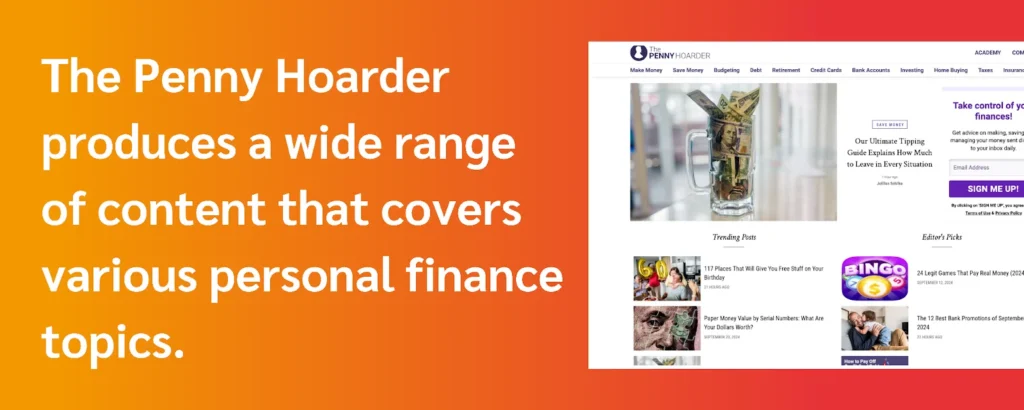
Source: The Penny Hoarder
Partnering with commerce content creators allows financial service brands to tell stories that resonate deeper, making their products more relatable. In addition, by reaching audiences through diverse content formats, brands can connect with consumers in the ways they prefer to engage, amplifying their message across multiple channels.
Influencers and financial experts: Build authority and trust
Influencers and financial gurus have built a wide audience within the finance sector, making them ideal partners. These individuals offer personalized recommendations based on their expertise, engaging their audiences through platforms like YouTube or Instagram.
In 2022, finance influencers on YouTube experienced an average growth rate of nearly 8 percent, outpacing other industries, which saw less than a 4 percent growth rate. This trend highlights a growing public interest in financial advice from non-traditional sources, especially during economic uncertainties.

Source: Graham Stephan
This type of partnership taps into the influencer’s credibility to increase engagement and drive traffic, making it a compelling strategy for promoting financial services.
Mobile partners and app developers: Reach on-the-go consumers
Mobile partners and app developers play a pivotal role in reaching tech-savvy consumers who manage their finances on the go. These partners can integrate financial products into mobile apps or use in-app ads to engage users.
For instance, in 2024, Acorns, the micro-investing app, expanded its partnership with Helix to launch the Mighty Oak Debit Card, which integrates banking features with investment opportunities. This card allows users to invest spare change from purchases and automatically save a portion of their paycheck. Acorns has also integrated its services with budgeting apps and collaborated with mobile-first finance education platforms to expand its reach among smartphone users.
Through partnerships like this, brands can directly offer their financial products to consumers when they are most engaged and ready to make decisions.
Customer advocates: Increase trust through authentic testimonials
Customer advocates are loyal customers who actively promote a brand’s products or services. By sharing their personal experiences with financial products, they create authentic word-of-mouth recommendations that resonate with potential customers.
With consumers growing increasingly skeptical of traditional advertising, customer advocacy has become crucial for brands to form deeper, more authentic connections with their audience.
Including customer advocates in their affiliate marketing strategies allows financial service brands to amplify their messaging and build a network of loyal customers who actively promote their products.

Source: Credit Karma
The company incentivizes users to invite friends to join the platform, sharing their positive experiences with credit score monitoring and financial product recommendations. Ken Lin, the CEO of Credit Karma, has credited peer-to-peer marketing as a huge driver of the company’s growth, noting how user engagement and satisfaction lead to repeated visits and organic brand promotion.
How affiliate software works
Affiliate software makes partnerships possible. Partnership platforms like impact.com cover the entire arc of the affiliate partnership. Instead of requiring a team to track sales or manually total up commissions individually, affiliate software saves time and avoids mistakes by streamlining the process of managing referrals and payouts.
The software does not stay rigid either. It can be scaled up so larger businesses can handle different affiliates and marketing campaigns for various financial products.
Some finserv brands might need customizable support or focused attention on a specific few affiliate partners. Affiliate software platforms make partnerships smoother and more effective. It’s helpful to keep these benefits in mind.
Sales and commission
Manually tracking each sale or website view increases the chance of mistakes. Late or incorrect commission payments can damage the relationship between a finserv brand and its affiliate partners. The steps involved in triggering a payment are complicated. Some brands pay affiliates when a consumer follows a link, while others wait until a credit card application is approved.

Here’s where well-designed affiliate software shows its value. Affiliate software correctly tracks sales and pays commissions every time, building trust between companies and affiliates.
Data and demographics
Tracking sales data and customer demographics with affiliate software makes it easier for brands to find their target audiences. Affiliate software breaks conversions and sales down into actionable data, informing future decisions on affiliate partners, discounts, and marketing strategies.
You need a robust system to handle this data, especially when many affiliate partners are involved. Affiliate software displays data on customizable dashboards and shows actionable information every step of the way. It helps you produce well-informed decisions and strengthens partnerships for the future.
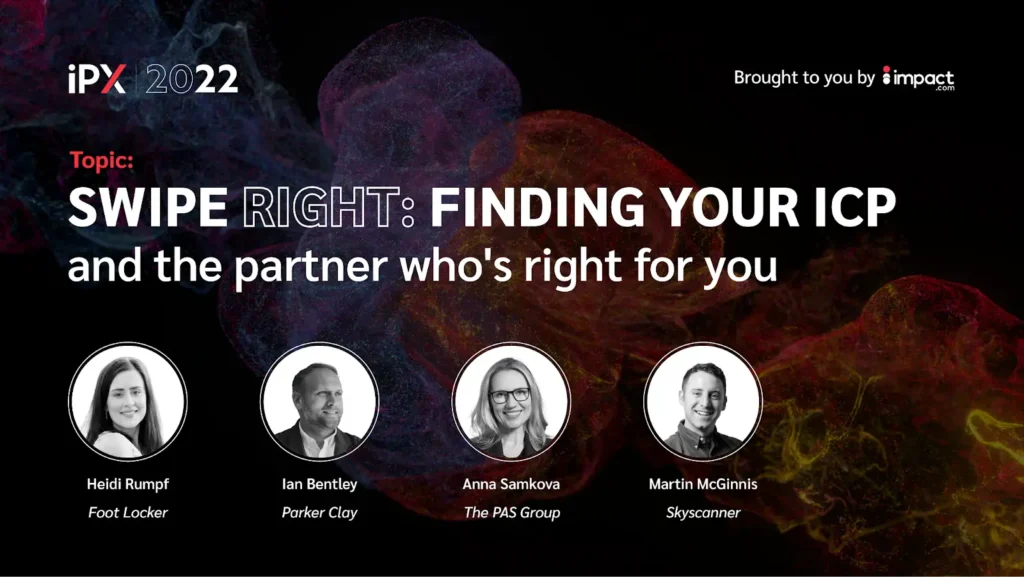
A quick guide to getting started with finserv affiliate marketing as a brand and an affiliate
Now that you understand the benefits of affiliate marketing, here’s the best way to start with finserv affiliate marketing.
As a finserv brand, it’s important to build effective partnerships to make sales and find new customers. These four steps spell out the whole process:
- Join an affiliate platform with software and systems that bring together finserv brands and reputable affiliate partners.
- Communicate your brand’s message and the strengths of your products and services. Potential affiliate partners need to understand your business strategy and promote your products without confusion or hesitation.
- Partner with the right affiliates to reach your ideal customers and target audience. Finding affiliates with shared values and interests improves conversions and sales.
- Pay compensation after consumers follow affiliate links. Work out a percentage payment plan with affiliate partners or offer a flat fee for agreed-upon milestones.
If you’re an affiliate, here are four steps to finding finserv brand partners:
- Join an affiliate marketplace designed to connect you with the right brand for your content. With impact.com, you can connect with thousands of reputable brands looking to partner with great affiliates. Affiliate partnerships help brands connect with your audience and seamlessly bring commissions with well-designed automation tools.
- Decide which products and services you want to link and promote. It’s essential to be aware of your interests and strengths as a communicator since you’ll reference and recommend these brands in your future work, too. Sharing values goes both ways, so set up your partnerships for success.
- Once you spell out the details of your affiliate partnerships, add trackable affiliate links to your blogs, email campaigns, podcasts, social media posts, etc. The more naturally and smoothly you integrate your affiliate recommendation, the higher your chances of receiving successful referrals.
- Earn commission based on your agreements with the finserv brands you recommend.
FAQ
Affiliate marketing is a performance-based marketing channel where businesses reward partners that drive traffic, leads, or sales to the brand’s website. For financial services, this approach uses the credibility of trusted partners to bridge the gap between brand and consumer, demystify complex financial products, and empower target audiences to make informed decisions.
To start affiliate marketing in the financial sector, companies should join an affiliate platform that connects them with reputable partners. Communicating your brand’s message clearly is crucial and selecting affiliates whose values align with your own. Once partnerships are established, provide compensation based on performance metrics like sales or sign-ups. Utilizing an affiliate management platform like impact.com can streamline this process, offering tools for tracking, managing, and optimizing affiliate relationships.
Traditional advertising often needs help with trust issues and inefficiency in targeting specific consumer needs within the financial sector. Ads can be perceived as intrusive and may not reach the right audience. In contrast, affiliate marketing offers a personalized approach by working with trusted affiliates who provide honest reviews and insights. This builds consumer trust and ensures that promotions are seen by individuals who are more likely to be interested in financial products and services, leading to better engagement and conversion rates.
Optimize your finserv marketing strategy
Moving forward in affiliate partnerships takes planning, cooperation, and usable metrics.
Everyone benefits by partnering with the right people and finding ways to authentically integrate affiliate links and content.
Choose financial service affiliate marketing to maximize reach and profit while building stable partnerships for the future.
Are you keen to learn more or get a head start in financial affiliate programs? Contact a growth technologist at impact.com to help you with your affiliate marketing efforts.
Want to know more about affiliate marketing? Check out these other impact.com resources:






